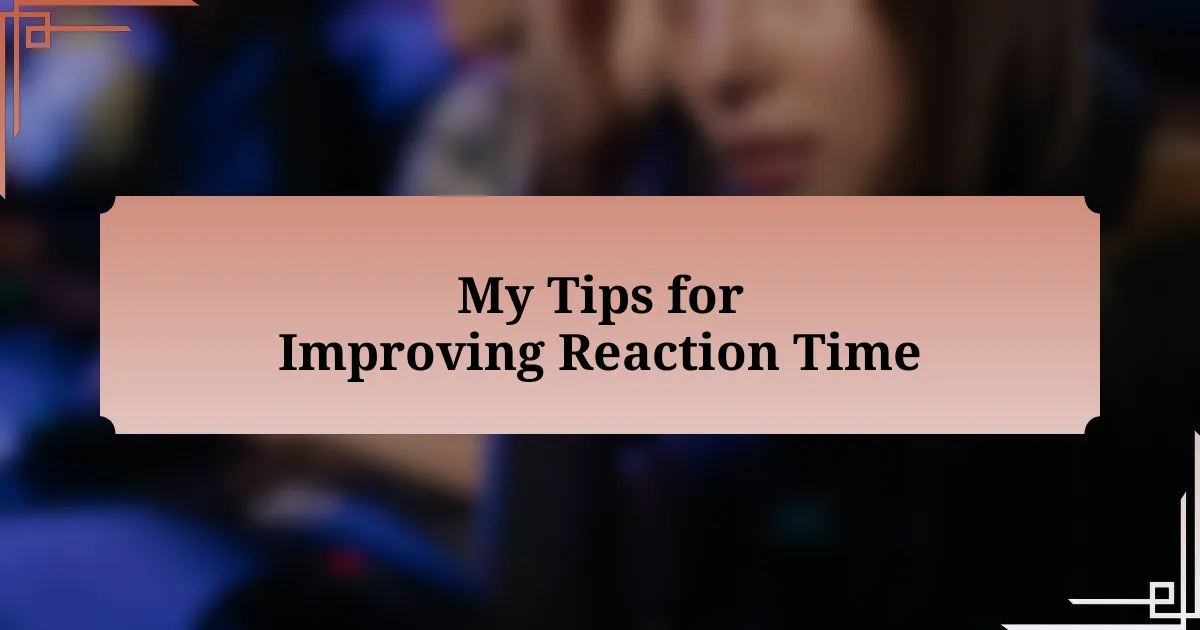Key takeaways:
- Reaction time is crucial in gaming, influenced by mental processes, environment, and physical condition.
- Specific exercises, such as hand-eye coordination drills and agility routines, can enhance reaction time.
- Nutrition, including complex carbohydrates and hydration, significantly impacts gaming performance and cognitive clarity.
- Mental strategies like visualization and mindfulness meditation can improve focus and reaction speed during gameplay.
Author: Evelyn Hartley
Bio: Evelyn Hartley is an award-winning author known for her compelling narratives and richly drawn characters. With a background in psychology and literature, she weaves intricate tales that explore the complexities of human relationships and the intricacies of the human psyche. Her debut novel, “Whispers in the Dark,” was celebrated by critics and readers alike, earning her a dedicated following. Evelyn’s work has been featured in various literary journals and anthologies, and she frequently speaks at writing conferences and workshops. When she’s not writing, she enjoys hiking in the mountains and volunteering at her local animal shelter. She resides in Seattle with her two rescue dogs, Luna and Milo.
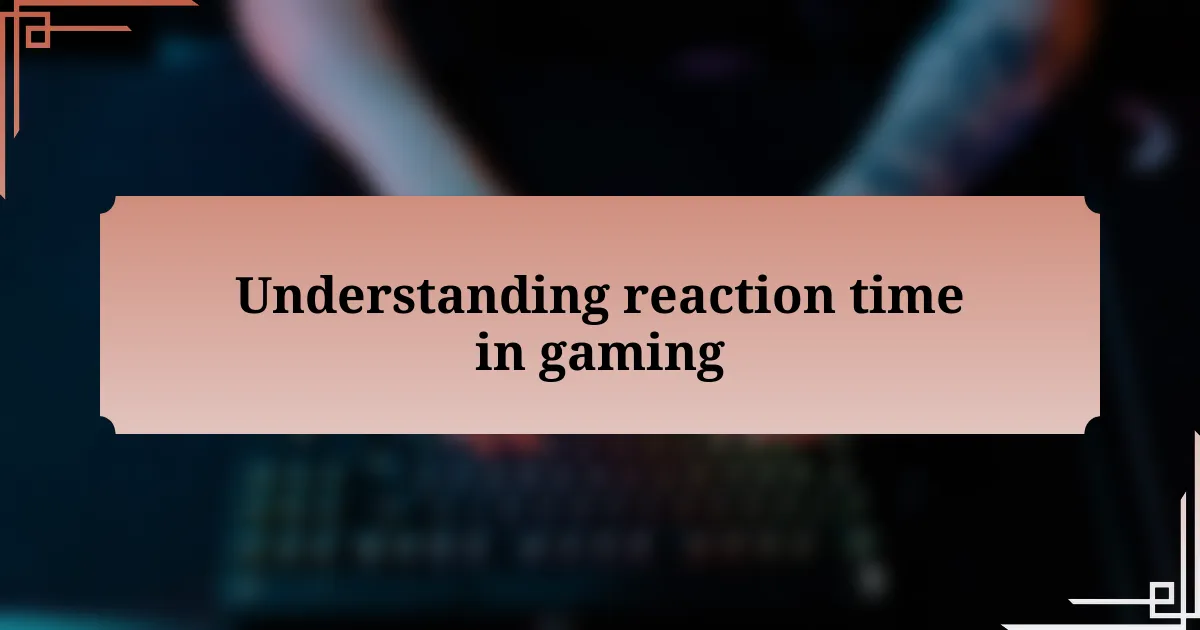
Understanding reaction time in gaming
Reaction time is a crucial element in gaming that can often make or break a player’s performance. I remember my first experience playing a fast-paced shooter where every second counted; I realized how my ability to react swiftly could mean the difference between a win and a loss. Have you ever felt that rush of adrenaline in an intense moment, where a split-second decision led to glory or failure?
Understanding reaction time goes beyond speed; it’s about the mental processes behind it. When I started practicing more consciously, I noticed that my reaction time improved only when I was fully engaged, focusing not just on the game but also dismantling my psychological barriers. This connection between mental clarity and swift responses is what separates casual players from serious competitors.
Incorporating consistent practice and reflex drills is vital for enhancing reaction time. I often find that short, intense practice sessions lead to significant improvements. Have you tried simulating gaming scenarios to train your mind and fingers? It’s surprising how honing your skills outside of a competitive environment can translate into better performance when it counts.
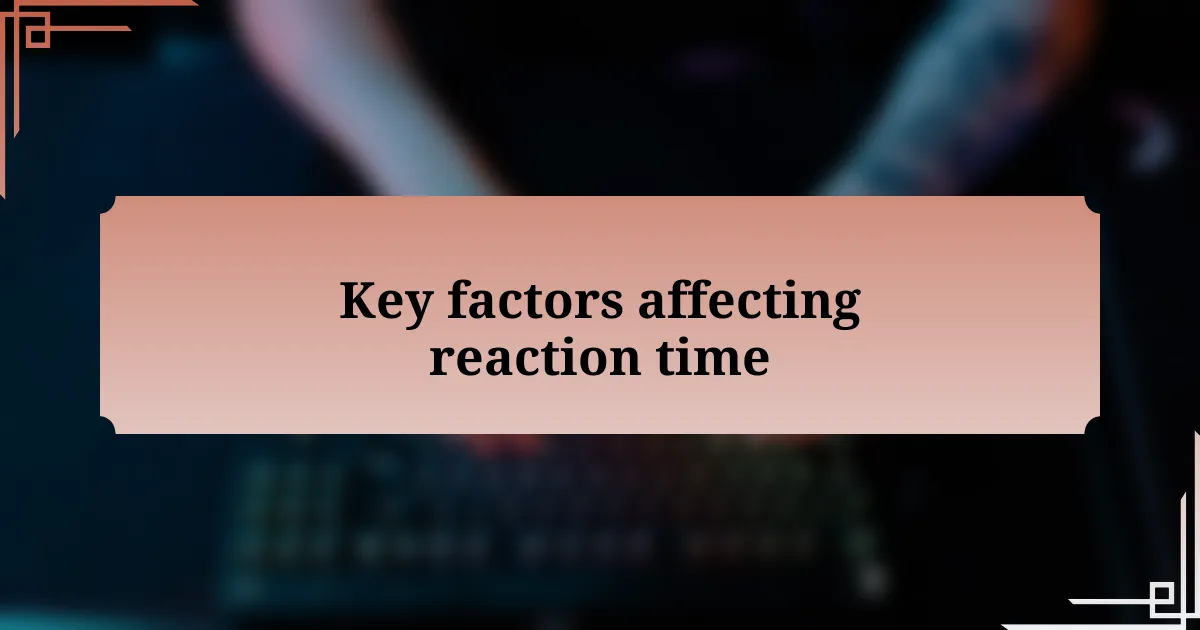
Key factors affecting reaction time
The environment in which you play can significantly influence your reaction time. For instance, I once switched from playing in a dim room to a well-lit space, and it was like a light bulb went off. That simple change helped me recognize on-screen movements faster, proving how even subtle differences in our surroundings can sharpen our instincts.
Another factor to consider is your physical condition. When I started paying more attention to my sleep, nutrition, and exercise, I was amazed by how this positively impacted my in-game performance. Have you ever noticed how fatigue can slow your reflexes? I sure have; those late-night gaming marathons often left me missing critical shots simply because I was too tired to think clearly.
Finally, practice and experience play crucial roles. During my early days in competitive gaming, I could barely keep up with faster players. But over time, I learned that facing stronger opponents not only challenged me but also honed my reaction times. It’s fascinating how pushing beyond comfort zones can lead to remarkable improvements. What experiences have you had that pushed your limits?
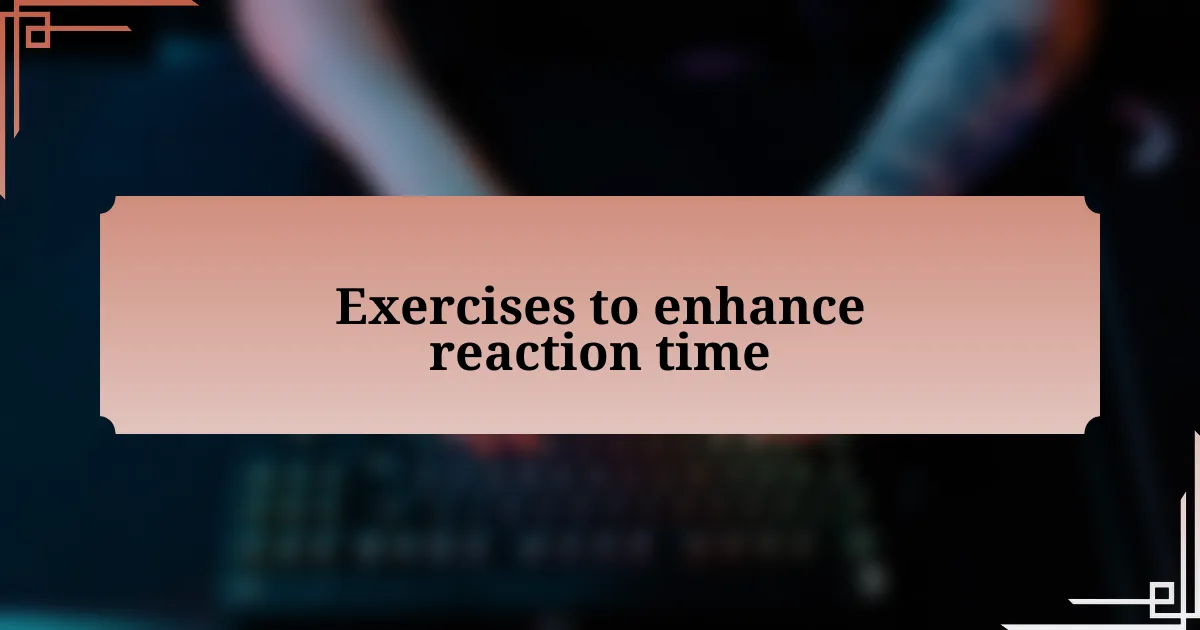
Exercises to enhance reaction time
To enhance your reaction time, incorporating specific exercises into your routine can make a real difference. For instance, I often practice hand-eye coordination drills. Using a reaction ball, which bounces unpredictably, forces me to focus and respond quickly. Each time it surprises me, I’m reminded just how much faster I can become with focused practice.
Another effective exercise I’ve found is using gaming software designed to measure and improve reaction times. These programs typically present visual or auditory cues that require immediate response, which helps simulate the intensity of real gaming situations. The first time I completed a session, I was both exhilarated and overwhelmed by how quickly my heart raced in anticipation. Have you tried these tools? They can really mimic the fast-paced actions you face in competitive gaming.
Finally, I recommend incorporating physical fitness routines, like agility drills or quick sprints. I noticed that my reflexes improved dramatically after adding these into my gym sessions. There’s something about elevating my heart rate that keeps my mind sharp and ready to react. How about you? What kinds of physical activities do you enjoy that could complement your gaming skills?
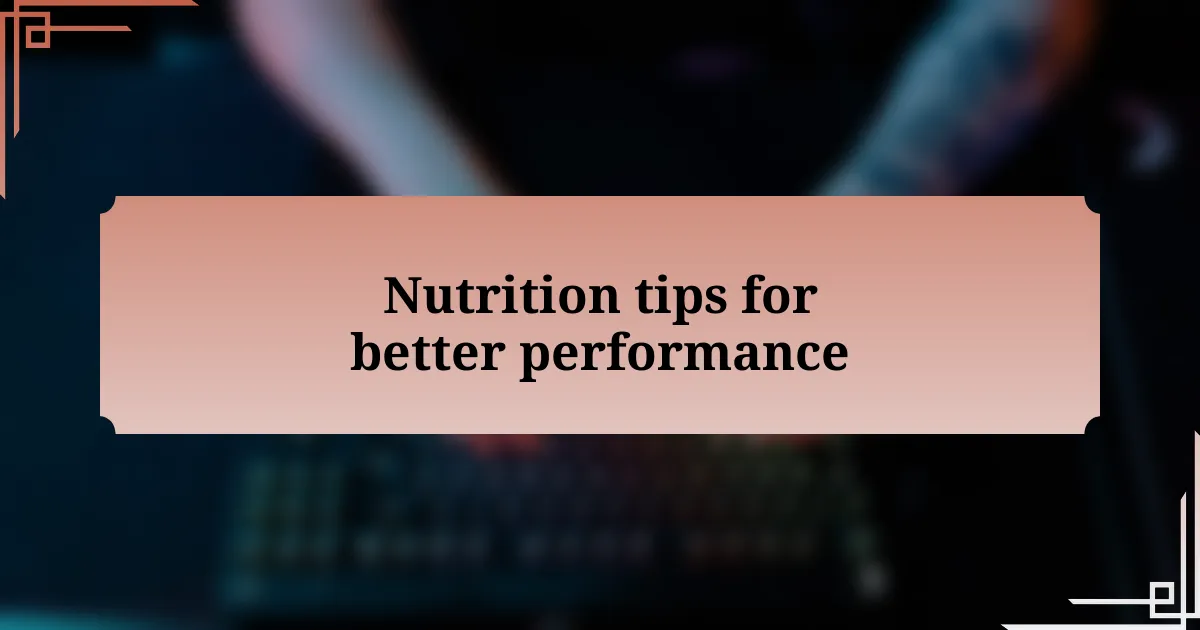
Nutrition tips for better performance
When it comes to nutrition, the food we choose can have a profound impact on our gaming performance. I’ve found that incorporating complex carbohydrates, like whole grains and fruits, provides sustained energy. I remember a tournament day where I opted for a breakfast of oatmeal and banana, which kept my energy levels stable throughout hours of intense competition. Have you considered what you eat before you play?
Hydration is another crucial factor that often gets overlooked. I always make it a point to drink water consistently, especially leading up to a gaming session. I once participated in an event where I neglectfully skipped my water intake. By mid-session, I felt sluggish and my focus suffered. Keeping hydrated not only sharpens my concentration but helps with quick decision-making when the pressure is on.
Moreover, incorporating foods rich in omega-3 fatty acids, like salmon and walnuts, can really boost brain function. After I started including these in my diet, I noticed a difference in my cognitive clarity during games. It’s fascinating how what we eat directly influences our mental acuity, isn’t it? What dietary changes have made a difference for you in high-pressure scenarios?
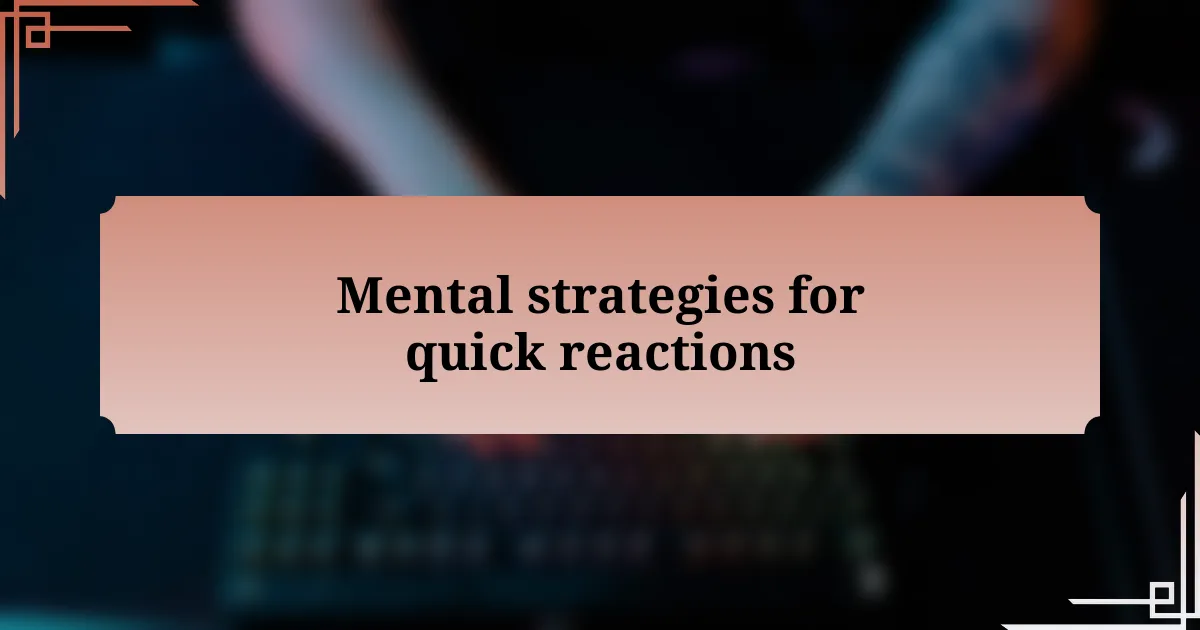
Mental strategies for quick reactions
One effective mental strategy I’ve embraced is visualization. Before I dive into a game, I take a moment to close my eyes and mentally rehearse my moves and responses in high-pressure situations. This technique not only calms my nerves but enhances the neural pathways associated with my reactions. Have you ever tried picturing yourself succeeding in the moment?
Another tactic I find beneficial is mindfulness meditation. By dedicating just a few minutes a day to mindfulness, I’ve bolstered my ability to stay present and focused, which translates into quicker reactions during gameplay. I remember a past competition where I felt overwhelmed; taking a brief moment to center myself allowed me to regain clarity and respond to my opponents swiftly. Has finding your center ever made a difference in your performance?
Additionally, I explore cognitive training games. These puzzles and brain teasers have sharpened my reflexes and improved my processing speed. I can see a tangible difference when I tackle complex strategies in-game. Engaging in such exercises makes me wonder: how often do we challenge our minds outside of gaming?

